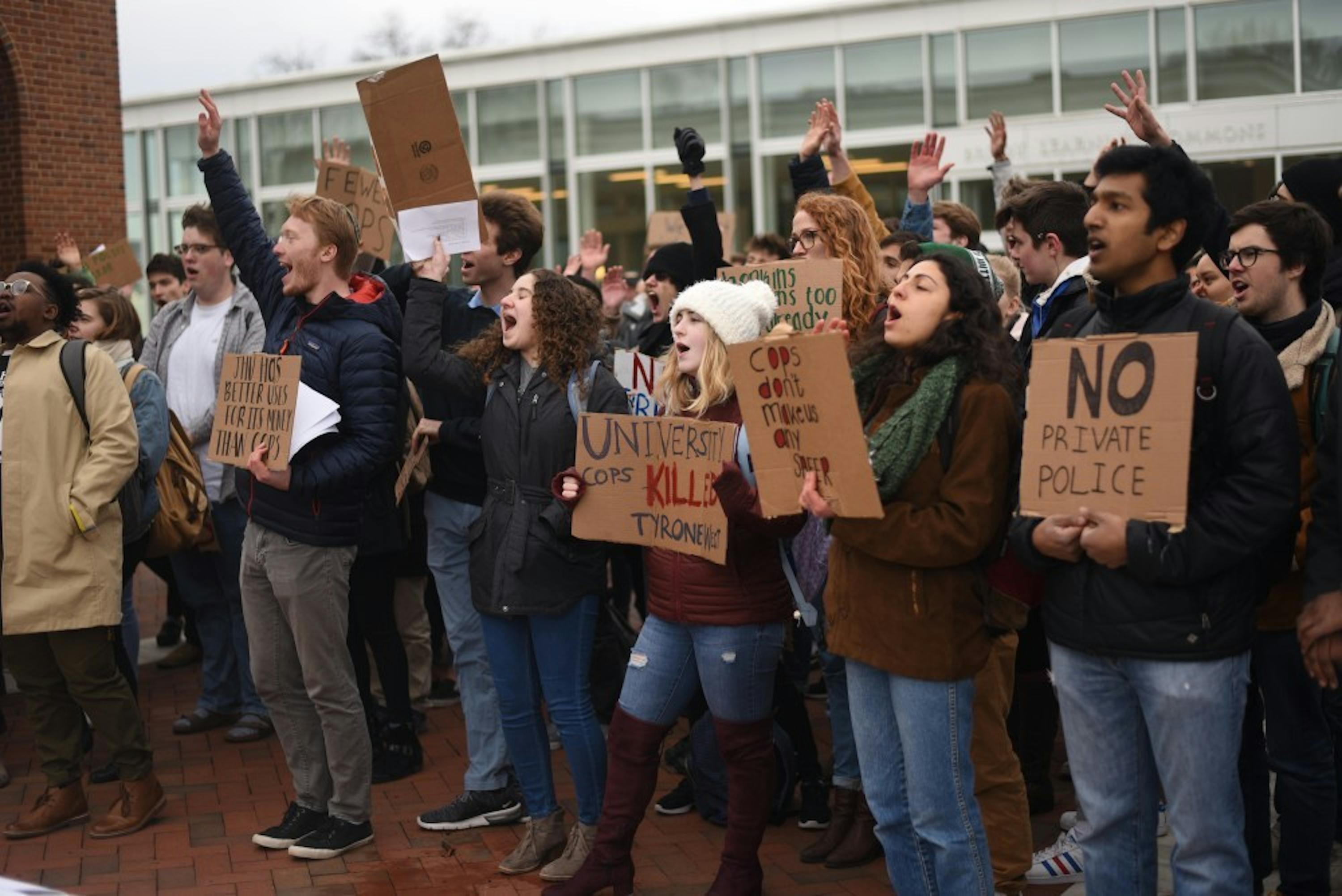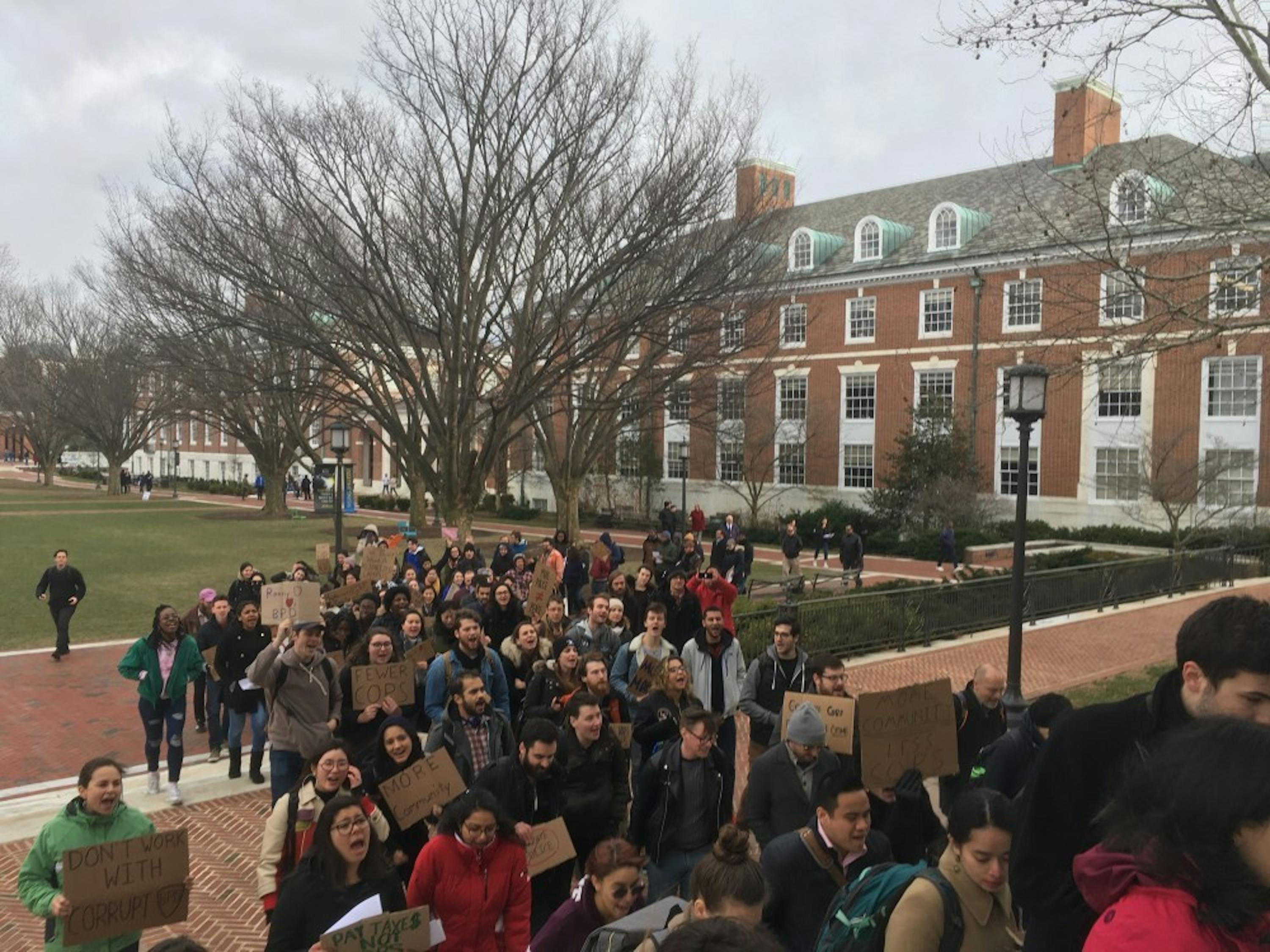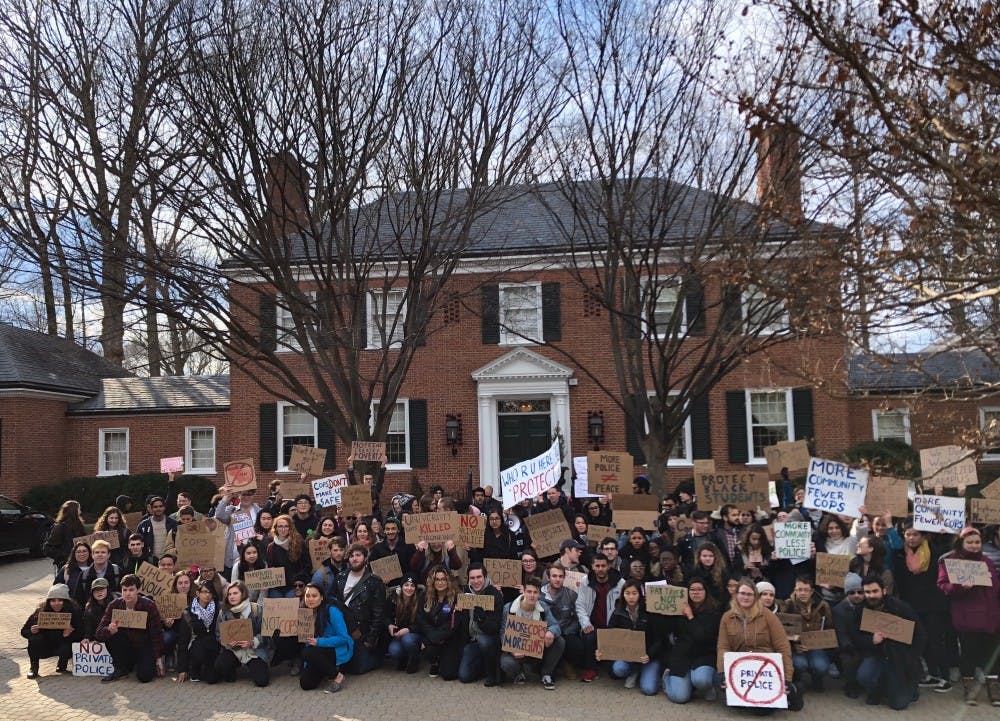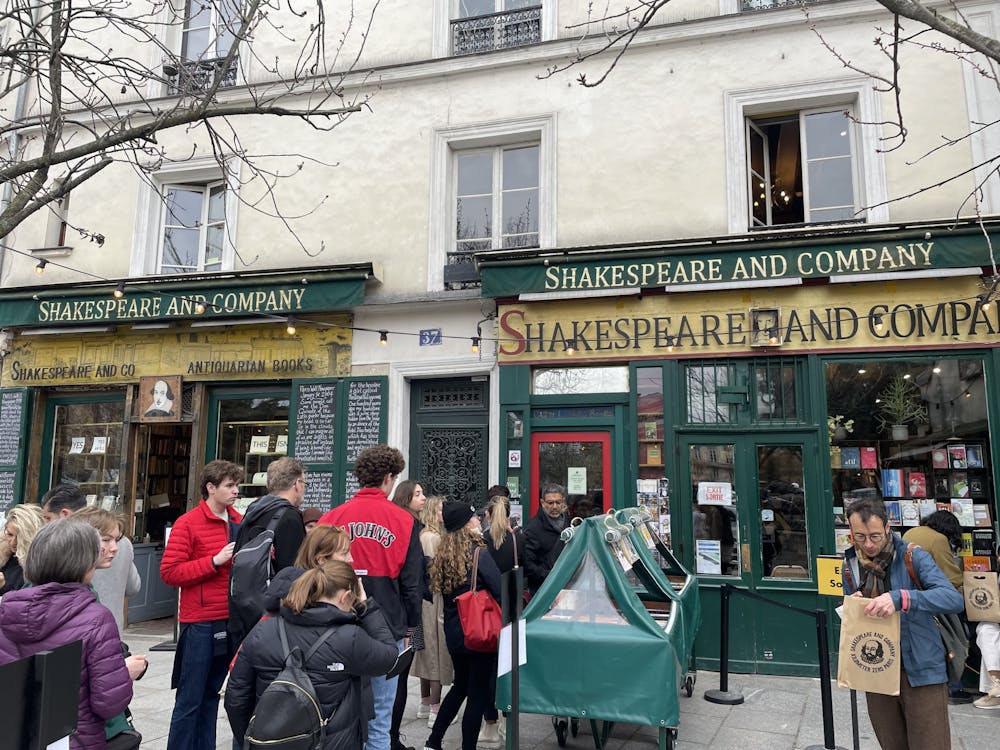Update: This article has since been updated to include a statement from the University.
Over 100 students, faculty and community members gathered outside of Brody to protest against a proposed Hopkins police force on Thursday afternoon. Later, protesters marched through Gilman Hall to University President Ronald J. Daniels’ home to voice their criticisms.
Last Monday the University announced its support for legislation that would grant independent institutions in Baltimore the ability to form their own police departments.
Many have expressed concerns that a campus police force would further damage relations between the University and the Baltimore community and would threaten the safety of students, particularly students of color. Others, however, argue that a Hopkins police force would better protect students and reduce crime on and around campus.
The protest was organized by Students Against Private Police, a coalition of 11 student groups including Students for a Democratic Society (SDS), Students for Environmental Action (SEA) and the Black Student Union (BSU).
Protesters shouted chants like “No justice / no peace / no private police,” “Black lives matter,” “Ronny D loves BPD” and “Bad for Baltimore / Bad for Hop / Pay taxes, not cops!”

Several community leaders and students, like freshman Jason Souvaliotis, spoke to a crowd outside of Brody to explain why they oppose a Hopkins police force. Souvaliotis, a member of SDS, said that he and other organizers wanted to send a message to the University.
“The bill contradicts our institution’s core values of transparency and inclusion — well, at least what we say our core values are,” he said.
Junior Chisom Okereke, the vice president of the BSU, added that she is worried about how the proposed police force would treat black students at Hopkins.
“Being a black student on this campus means that it is assumed by law enforcement that you do not attend this institution or are simply up to no good,” she said. “Partnering with the Baltimore Police Department, arguably the most corrupt police department in the country, shows a complete disregard for students of color on this campus that would otherwise be brutalized if they lived just a few blocks down the street.”
Reverend Cortly “C.D.” Witherspoon, who is also an activist with the Baltimore People’s Power Assembly, applauded students for participating in the protest and using their platform as members of the Hopkins community to advocate for others.
“People in this particular generation have always been the conscience of our society,” he said. “College activism is at the cornerstone of social justice movements throughout the world.”
Witherspoon also argued that University resources could be dedicated towards supporting campus workers instead of a police force.
“I think about the audacity to have private police when you don’t have every single worker on this campus making a living wage,” he said. “We have to make sure every person is treated with dignity and respect on this campus.”
The last speaker, senior Jessa Wais, who is a Baltimore native, called on the University to take more constructive steps to serve the City.
“Baltimore is a city with a lot of issues. It’s also a city with a lot of beauty and a lot of strength,” she said. “There are so many ways that Hopkins can and should direct its resources to make Baltimore a better, healthier and safer place. Investing massive amounts of money into a private police force is not one of them.”

Following Wais’ remarks, protesters marched across Keyser Quad through Gilman Hall while continuing their chants. Some carried signs with slogans like “More community / less police,” “We don’t want a militarized campus” and “Who are you here to protect?”
After exiting Gilman Hall, protesters made their way past the Hopkins Club and gathered outside of Daniels’ home on the east side of campus. Campus security told students to stay on the sidewalk, away from Daniels’ house, but ultimately allowed protesters to congregate near the front of his home.
Lieutenant Stephen Moffett of Hopkins Campus Safety and Security was present throughout the protest alongside other school security officials. He explained that he was there to ensure the security of both protesters and bystanders.
“Our role is simply to make sure that everyone has a safe space to express their beliefs, and that’s why we’re here,” he said.
Moffett also said that this protest did not violate any aspects of the controversial “Guidelines for Students in Support of Free Expression Through Protests and Demonstrations at the Homewood Campus.”
Senior Kyra Meko, president of SEA, explained that she and other organizers planned the protest within days, advertising it using social media, flyers and word of mouth. She believes it is important for the Hopkins administration to be aware of students’ concerns.
“We figured that if President Daniels is okay with sending a private police force into communities where people live, he wouldn't mind some visitors at his own house letting him know what they think,” she wrote in an email to The News-Letter.
Sophomore James Burnett, who led several of the chants throughout the march, was surprised that so many students turned out for the protest. He believes it is crucial for students to concern themselves with community issues in addition to their academics.
“If you go to Hopkins you are part of the greater Baltimore community. You can’t just stay in your books,” Burnett said. “The people in Gilman — their faces were completely shook when we walked in there. They were like, ‘Oh no, you’re disrupting our studies.’ But Hopkins is disrupting the community.”
Freshman Sebastian Fernandez also thinks that it is important for students to raise their voices on issues that also affect Baltimore city.
“We’re one of, if not the, largest employer in the City,” Fernandez said. “The policies that affect this institution by definition affect the entire city, so it’s important that we have our voices heard.”
Sophomore Gabby Jones was sitting in class when protesters marched into Gilman Hall. Her instructor dismissed class early so that the students could join the protest. Jones said that she is most worried about how a Hopkins police force would interact with students who identify as minorities.
“Marginalized communities are some of the ones that are the most affected by police brutality. Look at black communities, look at queer communities. They’re the ones under attack,” Jones said.
According to Alicia Badea, a member of SDS, the protest is just one way that organizers plan to voice their opposition. She added that defeating the Maryland legislation that would authorize Hopkins to create a police force, House Bill 1803 and Senate Bill 1241, is essential.
“[We are] definitely going to contact representatives for the Senate and House bills and afterward keep up with further demonstrations and events,” Badea said.
Meko stressed that students will continue to make their demands heard.
“A private police force would negatively impact the many Baltimore communities that Hopkins has already impoverished, displaced, and gentrified. It's our job as students to use our position of privilege to stand up to the University,” she wrote. “Today was just the beginning.”
In a statement sent to The News-Letter, the University explained that it will take into account input from affiliates and community members alike. The University hopes to use this feedback to inform decisions moving forward.
“It is important to note that we are at the beginning of a comprehensive process,” the statement read. “Under the proposed legislation, the specific size, scope, training, jurisdiction, and capabilities of a university police department would be developed in the months ahead.”
In addition, the University stated that it is soliciting feedback by reaching out to neighborhood associations and community leaders, holding information sessions at its campuses and taking comments online. According to the statement, some community members have requested that Hopkins do more to increase security in the neighborhoods around campus.
“The conversations we have with our community and neighbors will inform our decisions on these specific issues, as will the conversations we have with experts at peer institutions in the city and across the country—most of which already have university police departments,” the statement read.
The University stressed that it values feedback, and ultimately strives to create a University police department that will be specifically trained for addressing the needs of the Hopkins campuses.





